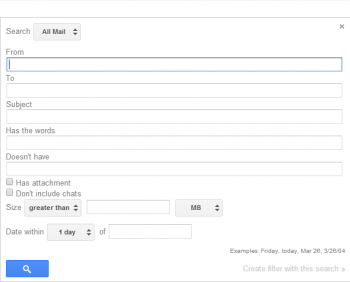There are a lot of reasons to love Gmail, and the ability to search for a particular message using just about any parameter in an email is one of them. Using simple operators, you can look for emails based on senders, keywords, dates, attachments, boolean constructions, and more. That can come handy when you’re looking for an obsure email sent to you ages ago.
The Gmail Search box is where all the action takes place. Plug in a word, hit Enter or click the Search icon, and Gmail starts looking for matches. Any message that includes your search term is listed for you to review. If you use Google’s Calendar, any matching entry there will be returned as well. Google automatically searches everything but messages in Trash and Spam, but I’ll show you how to get around that in a moment.

Searching for simple terms may do it for you. But if you have hundreds of messages from a particular person and want to find a specific message, or if you can’t remember a sender’s name but remember some keywords in the message, there are tools you can use to find the message by using search operators, either alone or combined.
Let’s say you want to find a message from Joe. You could enter joe into the Search box, but then you’d get all of the messages that were from Joe, to Joe, or even mentioned Joe (that’s right, search looks in the body of your messages for matches too.) To narrow the search to emails that Joe sent, you can use the from operator, and restrict the search to the from field of the email. For example:
- from:joe
Now you might know more than one Joe, so Google will suggest email addresses when you begin typing the name. We’ll use [email protected] for our examples. Also note that there are no spaces between the operator, the colon, and the search term.
You can look for all the messages sent to Joe by using the to: operator. For example:
Or you can restrict your search to words in the subject line. For example to look for the word vacation in the subject line of an email, use the subject: operator like this:
- subject:vacation
One of my favorite tricks is to exclude terms I know I don’t want included. This works on just about any site, from Google to Amazon. Just put a hyphen (minus sign) in front of the word you want to exclude (the NOT Boolean operator.) For instance, you want to find messages that have the word payment but want to exclude the word electric:
- payment –electric
Looking for messages sent at a certain time? Use after: and before: to define dates. For example, using the date January 1, 2014:
- after:2014/01/01
- before:2014/01/01
- older:2014/01/01
- newer:2014/01/01
Dates have to be entered in the yyyy/mm/dd format, which I find clunky, but it works.
To define a date range use two operators. For example, to restrict a search to the month of December 2013:
- after:2013/11/30 before:2014/01/01 (search term)
Or use the relative date terms older_than or newer_than with relative dates using d, m, and y for day, month, and year as in:
- newer_than:2d
- older_than:3m
You can combine operators and search terms to get even more specific. For instance you could look for an email from Joe that included payment in the subject line and was sent before January 1, 2014 like this:
- from:joe subject:payment before:2014/01/01
- “it’s your turn to make dinner”
Do you use those little colored stars to organize your messages? Find them quickly by using the has: operator:
- has:yellow-star
- has:green-star
etc.
Gmail search excludes messages in Spam and Trash by default. To include these folders in your search, use the anywhere: operator before your search term:
- in:anywhere
For more information on search operators, see Google’s Advanced search page.
Gmail’s Advanced Search dialog
Another way to create a search is to use the Advanced Search dialog box. Click the down-arrow to the right of the Search box.

You can use this to create a search if you don’t want to use operators. The same rules apply for Boolean constructions. Use capital “OR” to look for either of one or more terms, the hyphen (minus) for NOT to exclude a term. The Advanced Search dialog doesn’t have all the power that operators give you, but it’ll work most of the time.
If you don’t get the results you want, try changing some things around. I find that I don’t always get the results I expect on the first try.





